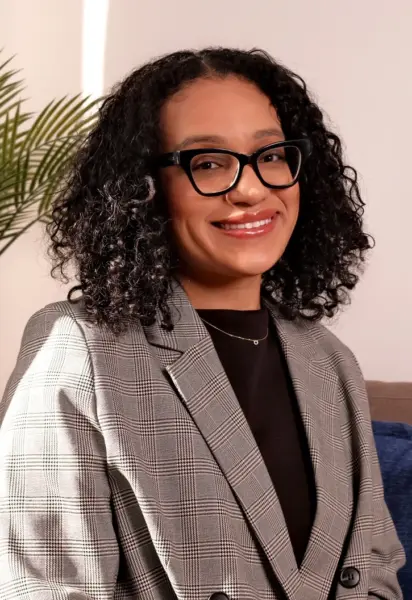Relationship OCD (R-OCD):
When Doubt Takes Over Love
Someone with R-OCD might love their partner deeply yet constantly question, “Do I really love them?” or “What if they’re not the one?” The resulting anxiety drives reassurance-seeking behaviors that temporarily soothe but ultimately reinforce the cycle of fear and uncertainty.

R-OCD:
How to Find Security Instead of Doubt
Relationship OCD, or R-OCD, is a subtype of Obsessive-Compulsive Disorder where intrusive doubts and fears focus on one’s romantic relationship. These doubts can target a partner’s qualities, one’s own feelings, or the “rightness” of the relationship itself.
The Nature of Doubt in R-OCD
Every relationship involves some degree of doubt, especially during transitions or stress. What makes R-OCD different is the intensity and persistence of uncertainty — and how much distress it causes.
In R-OCD, doubt isn’t a passing question but an intrusive thought that feels urgent and threatening. The person may spend hours analyzing, testing feelings, or comparing their relationship to others, trying to find certainty that never lasts.
Common Obsessions in Relationship OCD
R-OCD obsessions often target questions that cannot be answered definitively. Common examples include:
- “Do I really love my partner?”
- “Are they attractive enough?”
- “What if I’m making a mistake staying in this relationship?”
- “What if I fall out of love or realize they’re not right for me?”
- “What if I’m leading them on?”
- “What if my partner isn’t ‘the one’?”
- Some individuals also obsess about their partner’s feelings, worrying constantly, “What if they don’t love me enough?”
Common Compulsions in Relationship OCD
To relieve anxiety and gain certainty, individuals with R-OCD engage in mental or behavioral rituals, including:
- Reassurance-seeking: Asking friends, family, or the partner for validation (“Do you think we’re a good match?”).
- Mental checking: Replaying moments or testing emotional reactions (“Did I feel butterflies when they hugged me?”).
- Comparing: Measuring one’s relationship against others (“My friends seem happier—maybe I’m with the wrong person.”).
- Researching: Reading endless online articles about compatibility, love, or soulmate concepts.
- Confessing thoughts: Disclosing every doubt to a partner to feel morally “clean.”
These actions may offer momentary comfort but ultimately keep OCD’s doubt alive.
The Cycle of R-OCD
The R-OCD cycle mirrors other OCD subtypes:
- Intrusive thought: “What if I don’t love my partner enough?”
- Anxiety spike: Fear of being dishonest, stuck, or unloving.
- Compulsion: Checking emotions, asking for reassurance, or analyzing.
- Temporary relief: Anxiety drops briefly.
- Reinforcement: The brain learns that compulsions reduce anxiety — so the loop continues.
This cycle can overwhelm daily life, making relationships feel like a test instead of a connection.
Relationship OCD vs. Normal Relationship Doubt
It’s normal to question compatibility occasionally. The difference is in intensity and control:
- Normal doubt feels manageable and occasional.
- R-OCD doubt feels urgent, obsessive, and distressing.
- People with R-OCD often recognize their fears are irrational yet can’t stop ruminating. They may even break up to escape the anxiety, only to find that doubt returns in the next relationship — confirming that the issue lies with OCD, not the partner.
How R-OCD Impacts Relationships & Emotional Health
R-OCD can erode closeness and trust. The sufferer may appear distant, indecisive, or emotionally inconsistent, confusing partners who misinterpret the anxiety as ambivalence. Over time, guilt, shame, and exhaustion can set in.
The disorder can also distort one’s sense of love itself, replacing connection with constant evaluation. Instead of experiencing love naturally, individuals may monitor their every emotion, searching for reassurance that their feelings are “right.”
Evidence-Based Treatment for Relationship OCD
Exposure and Response Prevention (ERP)
ERP is the most effective treatment for R-OCD. It involves facing triggers — such as uncertainty about feelings — while resisting reassurance or mental checking.
For example, a client might practice noticing the thought “What if I don’t love my partner?” without analyzing it or seeking validation. Over time, the brain learns that anxiety fades without compulsions, and the need for certainty weakens.
Supporting a Partner With Relationship OCD
If your partner has R-OCD:
- Don’t provide reassurance (“Yes, you love me”). Instead, respond with empathy: “I know this feels hard, and I trust you’re working through it.”
- Learn about OCD to reduce misinterpretation of behaviors.
- Encourage therapy and celebrate small steps toward resisting compulsions.
- Maintain connection through shared activities, not reassurance-based conversations.
- Compassionate understanding helps couples navigate R-OCD together without enabling the cycle.
R-OCD can also distort one’s sense of love itself, replacing connection with constant evaluation. Instead of experiencing love naturally, individuals may monitor their every emotion, searching for reassurance that their feelings are “right.”
Final Thoughts on R-OCD
Relationship OCD can make love feel like a constant test, but love itself isn’t the problem — anxiety is. When you stop chasing perfect certainty and begin tolerating the discomfort of “not knowing,” real emotional freedom becomes possible. ERP and ACT help individuals reconnect with genuine affection and presence instead of obsession and reassurance.
If you see yourself in these patterns, you’re not alone — and you’re not broken. With evidence-based therapy, peace and connection are completely achievable.
Meet Our NJ Therapists
FAQ About R-OCD
Can R-OCD make someone fall out of love?
No, it doesn’t cause love loss. It causes doubt and anxiety that mask genuine feelings and can erode feelings of closeness and security in relationships.
Does R-OCD mean the relationship is wrong?
Not necessarily. The doubt itself is a symptom, not a reflection of compatibility.
- Feeling comfortable talking to your therapist
- Your therapist respects boundaries
- You’re moving towards your goals
- You feel listened to
You’re doing better in life - Your self-esteem is getting better
Can R-OCD be triggered by trauma or breakups?
Stress or major transitions can trigger OCD in those who may be more prone to impulsive disorders and anxiety disorders, however, stress can not cause OCD.
What if I break up — will it stop?
Often, the same pattern appears in future relationships unless OCD is treated directly.
Is ERP safe for relationships?
Yes. ERP is collaborative and focuses on tolerating uncertainty, not forcing decisions
How long does recovery take?
With consistent therapy, many people see major improvement within the first few weeks of OCD therapy
What Questions Should I Ask My New Therapist?
Feel free to ask anything. Some good questions are:
- How often will we meet?
- What do you specialize in?
- What experience do you have with my issue?
- What outcomes can I expect?
- How will I know I’m progressing?
- How long do you usually work with clients?
- How will we set my treatment goals?






